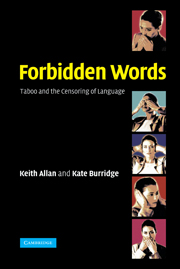Book contents
- Frontmatter
- Contents
- List of figures
- Acknowledgements
- 1 Taboos and their origins
- 2 Sweet talking and offensive language
- 3 Bad language? Jargon, slang, swearing and insult
- 4 The language of political correctness
- 5 Linguistic purism and verbal hygiene
- 6 Taboo, naming and addressing
- 7 Sex and bodily effluvia
- 8 Food and smell
- 9 Disease, death and killing
- 10 Taboo, censoring and the human brain
- Notes
- References
- Index
3 - Bad language? Jargon, slang, swearing and insult
Published online by Cambridge University Press: 03 December 2009
- Frontmatter
- Contents
- List of figures
- Acknowledgements
- 1 Taboos and their origins
- 2 Sweet talking and offensive language
- 3 Bad language? Jargon, slang, swearing and insult
- 4 The language of political correctness
- 5 Linguistic purism and verbal hygiene
- 6 Taboo, naming and addressing
- 7 Sex and bodily effluvia
- 8 Food and smell
- 9 Disease, death and killing
- 10 Taboo, censoring and the human brain
- Notes
- References
- Index
Summary
Towards the end of Chapter 2, we remarked that the use of jargon is sometimes judged dysphemistic. This chapter reviews the reason for the denigration of jargon that leads some people to censor it; we seek to rehabilitate jargon. There are people for whom slang is taboo. We discuss the similarities and differences between jargon and slang, and X-phemistic evaluations of both. We also look at where swearing fits in the picture. Both slang and profane swearing are found only in colloquial styles – which leads us to the discussion of styles as varieties of English. From swearing and cursing, we proceed to insults and maledictions. Except for style, all these topics have at some time been referred to as ‘bad’ language.
Jargon
Readers of the previous chapter may well regard terms like orthophemism and cross-varietal synonymy as unwelcome jargon. Most people use the term jargon pejoratively, as does the author of the following quotation:
At a conference of sociologists in America in 1977, love was defined as ‘the cognitive-affective state characterized by intrusive and obsessive fantasizing concerning the reciprocity of amorant feelings by the object of the amorance’. That is jargon – the practice of never calling a spade a spade when you might instead call it a manual earth-restructuring implement.
(Bryson 1984: 85)So, should jargon be censored? Many people think it should. However, close examination of jargon shows that, although some of it is vacuous pretentiousness, and therefore dysphemistic, its proper use is both necessary and unobjectionable.
- Type
- Chapter
- Information
- Forbidden WordsTaboo and the Censoring of Language, pp. 55 - 89Publisher: Cambridge University PressPrint publication year: 2006



